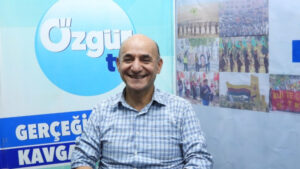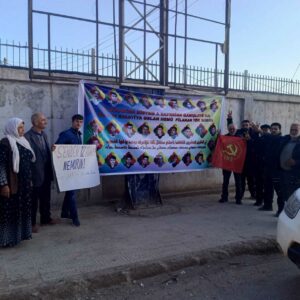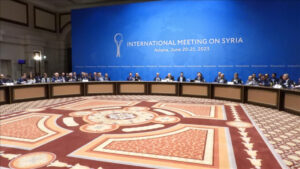On 21 April, the press centre of the HPG (People’s Defence Forces) stated that the Turkish army had begun its invasion of Metîna. The Turkish army began its attacks on the area in South Kurdistan on 16 April around the villages of Asê, Yekmalê, Xirabê, Xankê and Şêlazê in Metîna. Unlike previous attacks, however, the area was not immediately attacked as a whole, but rather the attacks were extended step by step. On the nights of 17, 18 and 19 April, the attacks were extended to the resistance areas of Girê Çarçel and Girê Ortê. These were bombed with fighter jets and combat helicopters. In the night of 19 April, the invasion was also extended to the Dergelê area. The occupation attacks are currently taking place in the areas of Girê Hekarî, Girê Çarçel, Girê Şehîd Çekdar, Girê Şehîd Piling, Girê Ortê, Asê, Yekmalê, Xirabê, Xankê, Şêlazê and Dergelê. In addition to the ongoing battles, the area is constantly bombarded by fighter jets and combat helicopters from the air and by rockets and howitzers from the ground.
Metîna is located in the Medya defence areas controlled by the Kurdish liberation movement, which have been repeatedly targeted by the Turkish state for years. It was only on 5 March that the fascist Turkish President Erdoğan declared that the issue of Turkey’s border with Iraq should be resolved by the summer and that the 30 km deep security zone on Turkey’s border with Syria should also be implemented. The Turkish state had strengthened diplomatic relations with Iraq in preparation for the invasion of southern Kurdistan that has now begun. On 14 March, a Turkish delegation, including Foreign Minister Hakan Fidan, Defence Minister Yaşar Güler and the head of the Turkish intelligence service (MİT) Ibrahim Kalin, met with Iraqi officers in Baghdad. The following day, the PKK was declared a “banned organisation” in Iraq by the Iraqi state without parliamentary approval on 15 March. Next Monday, on 22 April, the Turkish President is also expected to visit Iraq.
With the invasion of South Kurdistan, the Turkish state is pursuing the goal of crushing the Kurdish liberation movement within South Kurdistan. The Medya defence areas in particular are a strategic target for Turkey, as they represent an important retreat area for the Kurdish liberation movement. In addition, the Turkish state has suffered heavy losses here in recent months as a result of guerrilla actions and offensives. The current invasion can also be seen as revenge on the guerrillas. But the strategic importance of the Medya defence areas also makes it necessary for the Turkish state to crush the guerrillas, because if this succeeds, the Turkish state can intensify its attacks on the self-administration in northern and eastern Syria.
At the same time, the Turkish state not only has a military interest in completely occupying the Medya defence areas and crushing the Kurdish liberation movement there, but Turkey’s economic interests also play an important role. Together with Iraq, Turkey is pursuing the goal of establishing a new trade route. The trade route is to connect the Persian Gulf with Turkey and run through northern and southern Kurdistan. It is of course a major problem for Turkey if the Kurdish liberation movement controls areas in southern Kurdistan. However, the rigging of the local elections and the attempted election coup in Wan have also shown that Turkey sees any victories for the DEM party as a problem in North Kurdistan. In addition to the trade route, a new pipeline planned by Turkey is also to run through North and South Kurdistan. Due to the presence of guerrillas in South Kurdistan, these plans cannot be realised without problems.
However, we must also see the current invasion as a response to the victories of the DEM party and the defeat of the AKP-MHP regime in the local elections in Turkey. Despite the rigging of the elections and the attempt to appoint the AKP candidate as mayor in Wan, the uprising in Wan, in addition to the victories in the elections, made it possible to defend the election victory of the DEM party. The invasion is also intended to stabilise and secure the fascist AKP-MHP regime. The Kurds and the Kurdish liberation movement are to be portrayed as the enemy against which Turkey must jointly defend itself. However, the local elections have clearly shown that these attempts at division and distraction are slowly losing their effect.
The Turkish state’s invasion of the Medya Defence Areas aims to bring the whole of Kurdistan back under colonial occupation, with Turkey currently taking the leading role. For this reason, we must take to the streets all over the world against Turkey’s attempts to occupy the liberated areas of Kurdistan, such as the Medya Defence Areas and Rojava. We must also oppose the support of NATO countries for the Turkish occupation attacks. It is states such as the USA, Germany and Great Britain that support Turkey diplomatically, militarily and economically and thus give the green light for the attacks against Kurdistan.
We call on all trade unions, workers, women, LGBTI+, youth and all progressive movements to unite and take to the streets against Turkey’s occupation attacks against Kurdistan.



